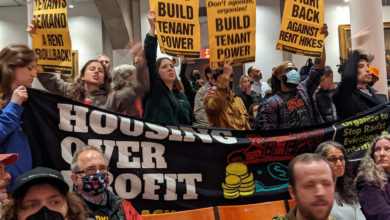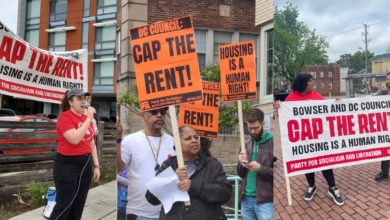On Aug. 7, an emergency protest was held in front of the Alabama Association of Realtors’ office in Montgomery, Alabama. The rally was held in defense of the federal eviction moratorium that was extended by the Biden administration on Aug. 4.
The AAR office was the site of the protest because the organization filed suit in federal court to try to overturn the moratorium. If their lawsuit is successful over 15 million people would be threatened with losing their homes from evictions or foreclosures.
But demonstrators in Alabama asserted that the courts and judges are not immune from struggle. If enough pressure is placed on the tiny elite to whom the courts are loyal, they can be forced to respect the people’s right to housing. For instance, in 1934 the Supreme Court ruled in the case of Home Building & Loan Association v. Blaisdell that a moratorium on foreclosures in Minnesota could stand because the right to housing trumped the contract clause of the constitution. This ruling came at a time of both profound economic crisis amid the Great Depression and of exploding class struggle as unions, socialist political parties and other types of people’s organization placed immense pressure on the system.
About the moratorium, the realtors group wrote in filing for the District of Columbia U.S. Court, “This gamesmanship comes at the expense of the nation’s property owners — who continue to suffer irreparable harm from the eviction moratorium every day this unlawful policy remains in effect.”
Protesters argued that no one should lose their housing, especially during a pandemic. “The government takes our taxes, what are they doing with them?” asked protester Ana Shimp. “The federal government has so much money and resources. They should actually pay all the landlords to cover the rent that people owe and cancel the rents. This is the only solution.”
John Pollock from the National Coalition for a Civil Right to Council spoke at the rally and pointed out that the government has already allocated $47 billion in rental relief which would be going directly to the landlords so there should be no need to end the moratorium. By some estimates $47 billion is more than enough to cover all the back rent owed for the entire country.
Pollock explained on the mic, “This lawsuit threatens to undermine all of the work, all of the advocacy, all of the effort that’s been made to try and bring an end to this crisis. That’s why so many organizations have been fighting to defend this moratorium.”
Protester Chad Greenidge explained that evictions are also an anti-racist issue, saying to the crowd, “Of the 8 million people behind on rent, 2 million of them are Black people struggling to make ends meet. Black families are 10 times less wealthy than white families. Only 40% of Black families own their homes, making eviction much more likely.”
Vicente Contreras with Cancel the Rents, which sponsored the protest, said in reference to the AAR’s lawsuit, “Protesting can make a difference. The opinions of the courts and politicians are influenced by the actions we take.”





